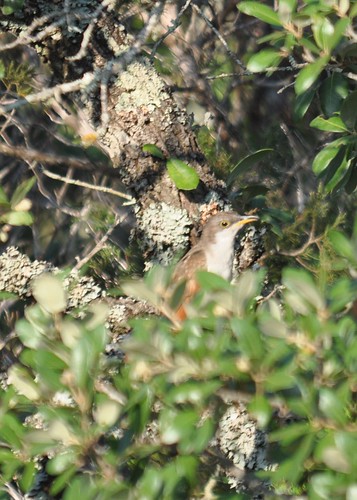The point is that I recently came across a fantastic book called The Birdwatcher's Companion to North American Birdlife, by Christopher Leahy. At just under 5 lbs. you won't find many people carrying it in the field, but its become one of my favorite books on the shelf.
For example, I was out birding Sunday morning, and although it was a very slow day, I did see this Yellow-billed Cuckoo.

This is a neat bird, but not rare or unexpected. Even so, it was Sunday's BOTD. Now here's the post-birding fun? I was talking about. The Birdwatcher's Companion tells us this under the entry for Cuckoo:
"The name, of course, comes from the song of the Common Cuckoo of Eurasia and first appears in English in the famous anonymous poem that begins: 'Summer is icumen in, Lhude sing cuccu.' It is the origin of the word 'cuckold' in reference to the species fame as a brood parasite, even though neither the male cuckoo nor the male of the host pair has been cuckolded."
It should be added that although cuckoos will lay eggs in another birds nest, they do not do this habitually.

August 29, 2010
ReplyDeleteDear Gideon,
I see in your lists of blogs you read that you have started a new blog!
I enjoy reading your descriptions of the process of identification of birds. The photography is fabulous.
P.A.